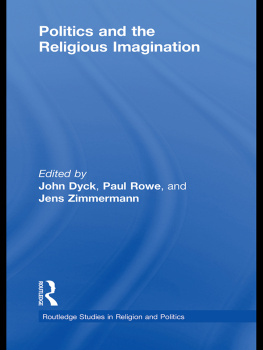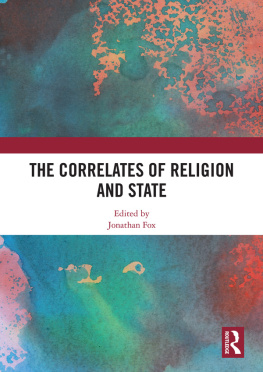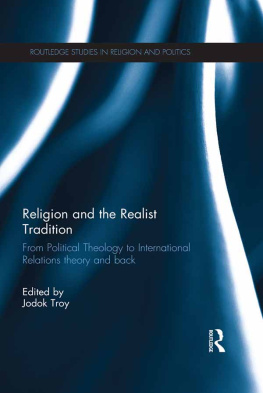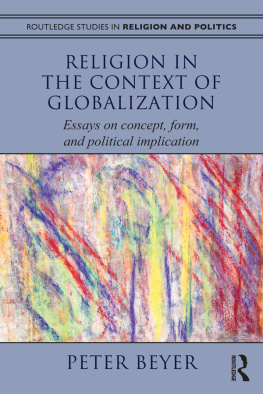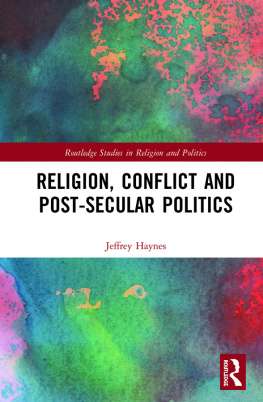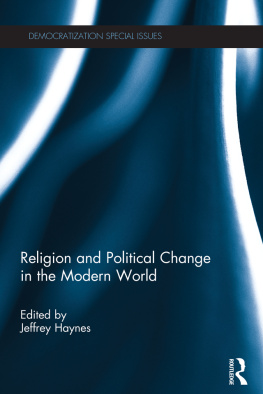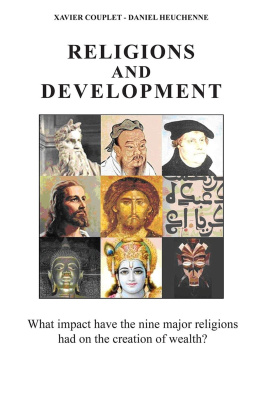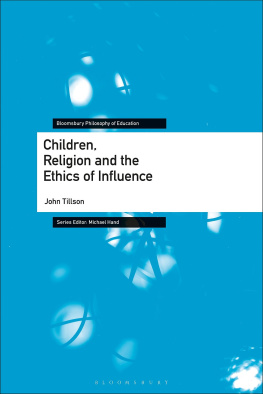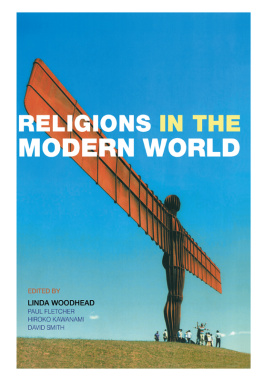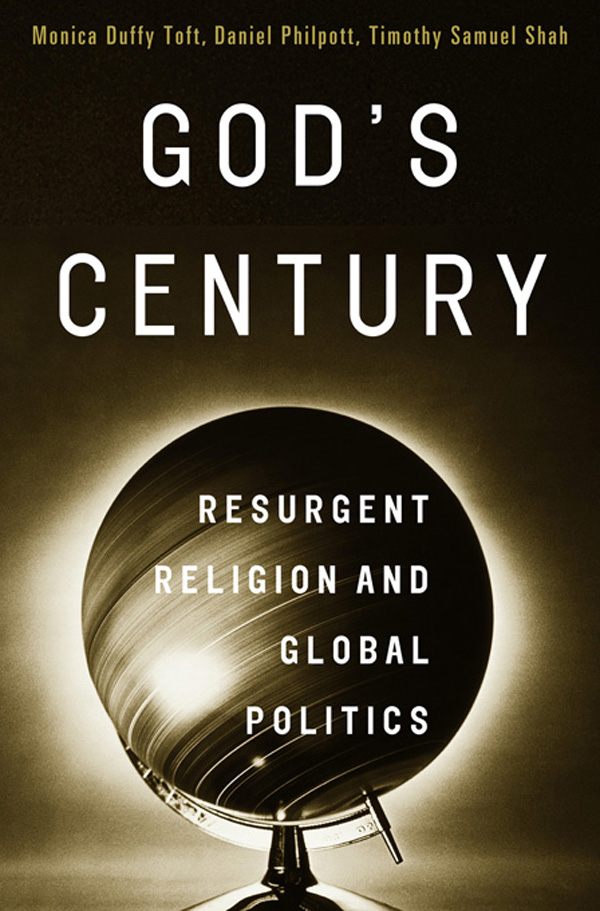
GODS
CENTURY
Resurgent Religion and Global Politics
M ONICA D UFFY T OFT
D ANIEL P HILPOTT
T IMOTHY S AMUEL S HAH

W. W. NORTON & COMPANY
NEW YORK LONDON
Copyright 2011 by W. W. Norton & Company, Inc.
All rights reserved
Printed in the United States of America
First Edition
Shah, Timothy S. Born Again in the U.S.A., from Foreign Affairs , September/October
2009, Volume 88, Number 5, pp. 13945. Excerpt reprinted by permission of Foreign Affairs . Copyright 2009 by the Council on Foreign Relations, Inc.
Philpott, Daniel, and Timothy S. Shah. Excerpt from Religion and International Relations Theory, edited by Jack Snyder and Alfred Stepan. Copyright 2010 Columbia University Press. Reprinted with permission of the publisher.
For information about permission to reproduce selections from this book,
write to Permissions, W. W. Norton & Company, Inc.,
500 Fifth Avenue, New York, NY 10110
For information about special discounts for bulk purchases, please contact
W. W. Norton Special Sales at specialsales@wwnorton.com or 800-233-4830
Manufacturing by Courier Westford
Book design by Lovedog Studio
Production manager: Julia Druskin
Ebook conversion by Erin Schultz, TIPS Publishing, Inc.
Library of Congress Cataloging-in-Publication Data
Toft, Monica Duffy, 1965
Gods century : resurgent religion and global politics / Monica Duffy Toft,
Daniel Philpott, Timothy Samuel Shah.1st ed.
p. cm.
Includes bibliographical references and index.
ISBN 978-0-393-06926-6 (hardcover)
1. Religion and international relations. I. Philpott, Daniel, 1967
II. Shah, Timothy Samuel. III. Title.
BL65.I55T64 2011
327dc22
2010045967
W. W. Norton & Company, Inc.
500 Fifth Avenue, New York, N.Y. 10110
www.wwnorton.com
W. W. Norton & Company Ltd.
Castle House, 75/76 Wells Street, London W1T 3QT
1234567890
In Memory of
Samuel P. Huntington, 19272008
Contents
The Twenty-First Century as Gods Century
Behind the Politics of Religion
The Rise of Politically Assertive Religion
Religion and Global Democratization
The Glocal Dimensions of Religious Terrorism
Religious Civil Wars: Nasty, Brutish, and Long
Militants for Peace and Justice
Ten Rules for Surviving Gods Century
List of Tables
Cases of Substantial Democratization by Region, 19722009
Democratizing Countries Where Religious Actors
Played a Democratizing Role, 19722009
Type of Democratizing Role Religious Actors
Played in Democratizing Countries, 19722009
Religious Actors That Played a Democratizing Role
in Global Cases of Democratization, 19722009
Religious Actors That Attempted a Democratizing
Role in Cases of Failed Democratization or
Democratization, 19722009
Undemocratic Countries in Which Religious
Actors Played a Counterdemocratizing Role,
19722009
Democratizing Countries in Which Religious Actors Played a
Counterdemocratizing role, 19722009
Religious Civil Wars, 19402010
Intrareligious and Interreligious Civil wars, 19402010
Cases of Mediation by Religious Actors
List of Figures
Institutional Independence of Religious and Political Authority
Relationships Between Religious and Political Authority
Change in Relationships Between Religious and
Political Authority
The Logic of the Argument
Countries with Transitional Justice Efforts
Chapter One
The Twenty-First Century as Gods Century
H AD AN ENTERPRISING FORTUNE-TELLER PREDICTIOD FOUR decades ago that in the twenty-first century religion would become a formidable force in global politics, educated people would have considered him a laughingstock. In 1968, Peter Berger, one of the past generations greatest sociologists, predicted that by the 21st century, religious believers are likely to be found only in small sects, huddled together to resist a worldwide secular culture. Similarly, in 1966 Time magazine printed starkly on its cover, Is God Dead?, recalling German philosopher Friedrich Nietzsches audacious assertions at the end of the previous century: God is dead. God remains dead. And we have killed Him.
Global trends seemed to support these prophets of decline. Like dying supernovae, every major religion on every continent seemed to be rapidly losing its influence on politics, economics, and culture. More than that, they seemed afloat on a receding wave of history, destined for oblivion. Surging forward with seemingly unstoppable historical momentum were instead ideologies and doctrines that sought to replace religion as the source of peoples loyalties. Apostles of nationalism, socialism, and modernizationsuch as Fidel Castro of Cuba, David Ben-Gurion of Israel, Gamal Abdel Nasser of Egypt, and the Shah of Iranwere men of the future. Mullahs, monks, and priests, with their dogmas, rites, and hierarchies, were creatures of an increasingly irrelevant past.
What came to be known as the secularization thesisthe prediction that religion would wilt before the juggernauts of the modern worldseemed triumphant. Science, the thesis held, would expose the supernatural as superstition and reveal the truth of humanitys origins and makeup. Historical inquiry would explain in similar fashion the trueand entirely human story behind events that the religious claimed to be miraculous and divinely orchestrated. Democracy, free thought, and open expression would allow ordinary citizens to challenge the myths and dogmas by which church authorities held people in servility and lent legitimacy to monarchy, aristocracy, and the favorite pastime of the powerful, war. Industrialization, economic growth, and technological progress would eradicate hunger, disease, and stunted opportunity, the forces that lead people to turn to religion for answers. All of this was hopeful. Religions regress spelled humanitys progress.
Such thinking originated in the Enlightenment philosophical movement of seventeenth- and eighteenth-century Europe. It included Thomas Jefferson, who edited his own version of the New Testament so as to omit all reference to the supernaturalheaven, hell, cross, and resurrectionand retain only the gentle ethical wisdom of Jesus, from which he believed readers could profit greatly. It also included Jean-Jacques Rousseau and other philosophers of the French Revolution, who sought to kill off the monarchy and the Catholic Church and replace them with a system of secular thought and culture centered on the nation. The thinking gained steam in the nineteenth and twentieth centuries in the thought of Nietzsche, Charles Darwin, Karl Marx, Sigmund Freud, Max Weber, and so many others. By the 1950s and 1960s, the secularization thesis all but dominated the university, most elite sectors in the West, and the views of Western-educated elites in Asia, Africa, and the Middle East.
But the secularization thesis has proven a poor guide to global historical reality. Contrary to its predictions, the portion of the world population adhering to Catholic Christianity, Protestant Christianity, Islam, and Hinduism jumped from 50 percent in 1900 to 64 percent in 2000. Globally speaking, most people79 percentbelieve in God (a slight increase from the late 1980s and early 1990s, which was 73 percent), and although in most countries majorities agree that religion is private and should be kept separate from government, these majorities are increasingly slim in a number of countries and the intensity of support for this separation has declined in over half of the countries polled. In India, for example, the number of people who completely agree on the separation of faith and government dropped from 78 percent to 50 percent in just five years, from 2002 to 2007. Thus, over the past four decades, religions influence on politics has reversed its decline and become more powerful on every continent and across every major world religion. Earlier confined to the home, the family, the village, the mosque, synagogue, temple, and church, religion has come to exert its influence in parliaments, presidential palaces, lobbyists offices, campaigns, militant training camps, negotiation rooms, protest rallies, city squares, and dissident jail cells. Workplaces increasingly are the sites of prayer rooms and small-group Scripture studies. Even sporting events now feature conspicuous prayers by players and coaches, huddled together in supplication to the Almighty. Once private, religion has gone public. Once passive, religion is now assertive and engaged. Once local, it is now global. Once subservient to the powers that be, religion has often become prophetic and resistant to politicians at every level.
Next page

